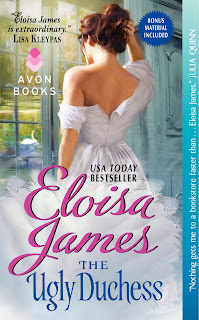I've been off Lorraine Heath lately, but the amount of domestic violence in Moonstruck Madness made me inclined to examine how a modern Avon author addresses it. It was interesting how less in charge of her life Winnie is than the heroine of McBain's book. The set up for The Last Wicked Scoundrel involves two side characters from an earlier series. Winnie is the widow of a duke and William is the physician that saved her life.
Both Winnie and William have an abuse history. Winnie is an orphan abused by her dead husband. William is a child of the streets with multiple abuse points. Both of them blame themselves and excuse their abusers in a fairly predictable and natural way. William's scars are internal, Winnie's external. (Cue yet another round of Scar Kissing.) In the three years that Winnie has been on her own, William has refused to cross the class and wealth lines that divide them. Until suddenly, he does.
(Spoiler alert. Part of William's problem has been that Winnie's husband wasn't dead. In an earlier book William and his friends staged the duke's death and shipped him off to Australia. The duke, having failed to die, returns with a fair amount of anger toward his wife.)
Winnie fears she's going mad and her physician is a natural place to turn. Faced with a new proximity, and having spoiler related reasons of his own, William sets about seducing her. This was utterly boring. I was interested in the emotional development of Winnie and William within the short confines of the novella but suddenly we're all about the licking and the stroking and the succumbing. Winnie never knew it could be like this, William has waited so long, yadda, yadda, yadda. Back to the plot.
While those surrounding Winnie consider her late husband a monster, he is properly shown to be a fairly average (if vindictive) man with entitlement issues. He murdered previous wives because they stood up to him. Winnie's failure to do so preserved her life. His thwarted plan for her disposal seems out of character and a bit convoluted, but I was willing to go with it. The acknowledgement that the women prior to Winnie were emotionally stronger but equally abused is important. Abuse is dictated by the abuser. It is their choices that dictate the violence. It is their failings that trigger it.
Winnie compares a moment of emotional damage from William to prior physical damage from her husband. It's important to me as a reader that she recognized it but it's more important that William accepts it. He doesn't tell her she's wrong, he examines if he agrees with her. He does and he makes amends. She is a woman determined to break old patterns. She is not willing to be in any way diminished. Unfortunately the author is working a tough tightrope by having Winnie skirt into TSTL territory. Winnie goes from never confronting a threat to thinking confronting threats alone is a better choice. It's not. It's pretty idiotic. Let's hand wave that and get back to William.
Spoiler Alert. [su_spoiler title="Can't Wait To Get Nasty?"]William killed his mother by accidentally shoving her down stairs while she was beating him. His father sells her body to the hospital and takes off. William becomes a mudlark, then a thief, then a physician to the Queen.[/su_spoiler]
William makes assumptions based on his abuse history that are natural and logical and get left unresolved. Heath addresses his survivor's guilt but leaves the possibility that his abuse was willingly enabled alone. Complicity in domestic violence is still pretty taboo for the historical romance world. Abusers are not monsters, in the sense that they can present normally and defend their actions. Collaborators may feel completely justified in their own choices or love the abuser to the point that they also subscribe to the logic of the abuse. (There's a lot in that basket. Maybe we'll unpack it in another thirty years.)
Overall The Last Wicked Scoundrel was worth the time. I would have liked less sex and more relationship building, but that's pretty much a given for me. Winnie has a few TSTL moments, including one that completely discounts parental rights in the Victorian era, but overall she's trying to take control of her life. William is wonderfully beta. I say give it a go.
* This review originally appeared at Love In The Margins.

















